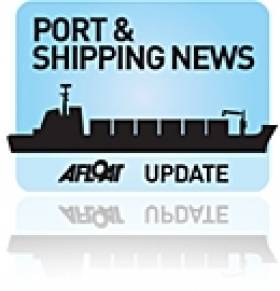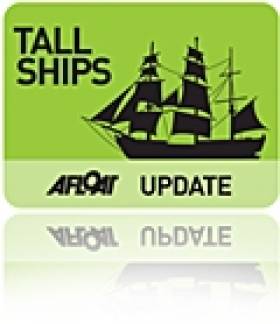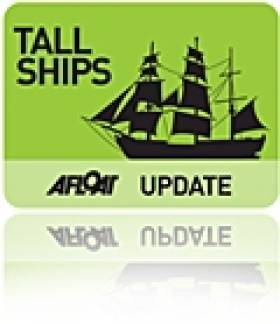Displaying items by tag: Paris
Cork Harbour Dinghy Sailors Announce 49er Olympic Campaign for Paris 2024
Tokyo 2020 stars Robert Dickson and Sean Widdlove of Howth have suddenly got competition with the announcement of a Cork Harbour rival campaign for Paris 2024 in the men's 49er skiff dinghy.
Both young members of the Royal Cork Yacht Club and UCC Sailing Club, and past pupils of Presentation Brothers College, Séafra Guilfoyle (25) and Johnny Durcan (21) have already started a rigorous training schedule with the Irish team for the Olympic qualifiers, which commence in August 2023.
Séafra Guilfoyle, who hails from Myrtleville, will be helm, steering the 2-man boat. The UCC economics student has recent experience competing for a berth in Tokyo 2020 with double Olympian Ryan Seaton of Belfast Lough where they missed out on qualification. It’s his dream to represent Ireland at the Olympics and Seafra says he’s ‘determined to reach Paris 2024’.
Both Séafra and Johnny started sailing at the age of 7 and 8 respectively and had great success at youth level. Séafra represented Ireland every year from the age of 12 to 18, winning multiple nationals and medalling at world championships and winning silver in the youth worlds in 2014.
Johnny represented Ireland on the international stage from the age of 11. He was top-ranked in Optimist sailing by the age of 13, a National Laser Champion at 14, a European Junior 29er Champion at 15, and winner of the European and Irish Nationals at 16.
Séafra says that he’s proud to partner with Johnny, as he is not only a fantastic athlete but an ‘inspiration’, following his near-death experience when his boat capsized at the 29er world championship in Long Beach, California, in 2017. It was only the quick action of his fellow competitors that saved his life. “Johnny was as comfortable sailing as he was walking. He was one of the firm favourites for the Laser Radial Worlds that year. It took him a while to get back out on the water after this, but not only did he pick himself back up, he has excelled and got back to the top of his game and is now about to embark on an Olympic campaign.”
 Launch party - A dolphin joins in the Guilfoyle/Durcan launch party in Cork Harbour
Launch party - A dolphin joins in the Guilfoyle/Durcan launch party in Cork Harbour
Their rigorous training schedule demonstrates this commitment. Séafra and Johnny have been training together almost seven days a week since May 2021, primarily in Dublin with the Irish team, their coach, and trainers, and back home at the Royal Cork.
Guilfoyle Durcan Sailing, as they are now known, will compete in their first competitive race this winter when they head to Oman for the World championships.
 Séafra Guilfoyle (left) and Johnny Durcan on the Royal Cork slipway
Séafra Guilfoyle (left) and Johnny Durcan on the Royal Cork slipway
They feel their competitive advantage in the Olympics will be their youth, their long-time friendship having come up through the sailing ranks together, their geographical proximity to each other, Johnny’s training experience with Annalise Murphy, and the fact that Seafra already has four and a half years’ experience in running an Olympic campaign behind him.
“The fact that we live so close to each other when we’re both at home, makes it easier to train outside of the official team Ireland training schedule”, says Johnny. “We’re both young and at the height of our fitness, and Seafra brings a lot of experience and learnings from his last campaign.”
Colin Morehead, Admiral at the Royal Cork Yacht Club said, “We’re incredibly proud of these two talented and ambitious athletes, who are one of the youngest Irish senior teams to ever compete for the 49er Olympics.”
Paris To Host Shortsea 13 Convention
#Shipping - The European Shortsea Conference will take place for the first time in France on Thursday 14 March 2013.
Shortsea 13 at La Defense in Paris is organised by the Bureau de Promotion du Shortsea Shipping (BP2S) and SPC France jointly with other European Shortsea promotion centres - and comes just weeks after the Euromaritime exposition that kicks of tomorrow in the French capital.
The conference will cover a number of hot topics related to shorts and intermodal intra-european transport, the challenges that exist and are yet to come, and what solutions can be found.
And like last year's event, hosted in Dublin by the Irish Maritime Development Office (IMDO) and Coastlink, the convention will provide a platform to network, discuss and debate issues shared by European shipping partners.
Organisers say that contributors are still welcome to take part as speakers (e-mail [email protected] for more) or sponsors (contact [email protected] for details).
Registrations will open soon for those wishing to attend as delegates. Keep an eye on the Shortsea 13 blog or find more information on the European Shortsea Network at www.shortsea.info.
Alliance Franҫcaise de Cork and Fondation Belém in association with the Port of Cork are pleased to announce arrival of the French tall-ship fleet, Belém, a 116-year old barque at one stage owned by the Guinness family, writes Jehan Ashmore.
During her four-day stay the pride of the French tall-ship fleet is to berth at Albert Quay, in the heart of Cork city-centre where the public can thread her timber decks on Saturday (2 July) between 11.30-17.00 hours and on Sunday (3 July) starting from 10.00 till 18.00 hours. There is an admission of €5 for adults, a concession of €3 and a family ticket costs €10.
Visitors can trace her long and varied career with an exhibit housed below decks of the historic vessel which was built in 1896 in Nantes. For nearly two decades she crossed the Atlantic transporting a diverse cargo but mostly spices, sugar and cocoa beans from her namesake port of Belém do Pará, on the north-east coast of Brazil bound for France. She would sail upriver on the River Seine to supply the cocoa beans for a Paris-based chocolate-maker.
Belem would later become under the British flag and she became the property of the Duke of Westminster, who converted her to a luxury pleasure yacht. In 1921 she was sold to the Hon. Arthur Ernest Guinness, who renamed her Fantôme II and took part in the Cowes regattas and cruised around the world between 1923 and 1924 with his family.
To read more on the vessel's other career's under several owners until her present-day role as a sail-training vessel operated by the Fondation Belém click HERE and also www.portofcork.ie
In addition to visitors boarding the Belem, the public are invited to attend free readings by the Cork poets William Wall and Thomas McCarthy. Accompanying the poets are French writers Maylis de Kerangal and Olivier Sebban for a session of Franco-Irish readings which too takes place on the Saturday evening between 18.00 -19.30 hours.
For further information contact Vytenė Laučytė, Cultural Coordinator, Alliance Franҫaise de Cork Tel: (021) 431 0677 or by email: [email protected]
All advance bookings for the visit on board the Belem are to be made at Alliance Franҫaise de Cork. Tickets are also available at the entrance to the tallship alongside Albert Quay, Cork. Last year Alliance Francaise celebrated its 50th anniversary
- Cork Harbour
- port of Cork
- Brazil
- Alliance Française
- Cork Harbour News
- Paris
- Belem
- Arthur Ernest Guinness
- Cocoa
- TallShips
- Albert Quay Cork
- Fondation Belem
- Tall Ships news
- Duke of Westminster
- Guinness
- Paris chocolate makers
- Fantome II
- William Wall
- Thomas McCarthy
- Cork poets
- French writers
- Maylis de Kerangal
- Olivier Sebban
Sailing Opportunities on 115-year French Tall-Ship
If you are interested in this adventure, registration is open until 1 March for those registering through the Alliance Française. A special Alliance Française price (excluding insurance) costs €780 and for €660 for those under 20 years of age. To book your place email: [email protected]
In July last year, the Belem, was chartered to make a special voyage to Dublin to celebrate the 50th Anniversary of Alliance Française in the capital. Taking part in the passage from Roscoff were 17 Irish people who joined in the crew. The four-day visit also celebrated the French national day, Bastille Day (14 July) which formed part of the inaugural French Market, held on the quayside close to the Convention Centre.
The ship was launched on June 10th 1896 and built in Nantes. She was named the Belem, after the north Brazilian port where the Crouan family had founded a trading post a few generations earlier. For nearly two decades the Belem sailed the Atlantic, carrying a diverse range of cargo but mostly spices, sugar and cocoa beans. The Belem would sail upriver on the River Seine to supply the cocoa beans for a Paris-based chocolate-maker.
During her long and varied career, the barque was sold to Arthur Ernest Guinness in 1921. Under the control of the Irish brewing dynasty, the vessel was renamed Fantôme II. The Guinness family established a strong attachment to the vessel which was completely refurbished from a working cargo vessel into that of a luxurious appointed yacht capable of accommodating 40 guests. Part of the work included an extension to the deckhouse for the purposes of a floating office, so business could be conducted, wherever the vessel happened to be.
In the period between March 1923 to March 1924 the Fantome went on a round the world tour going through the Panama Canal on the way out and returning via the Suez Canal.
Since 1987 the Belem has provided sail-training opportunities and is owned and operated by the Belem Fondation, a Paris based organisation set up by the Caisses d'Epargne, BPCE Group, after they bought back the ship in 1979. The principle role of the foundation is to keep the three masted barque as part of France's National Heritage. The vessel's historical and cultural significance was recognised in 1984 when the French government listed the barque as an historic monument.
Aside the role of sail training the Belem is unique in that she continues to carry occasional commercial cargo. In recent years the vessel has carried cargoes of wine from Bordeaux to Montreal in the Canadian French speaking province of Quebec. For information about Alliance Française in Ireland logon HERE in addition to the history and work of the Belem Foundation by clicking here.
Looking for further reading on Tall Ships in Ireland? Click the links below:
Click this link to read all our Tall Ships Stories on one handy page
Previewing Ireland's Tall Ships 2011 Season
Can Ireland Get a New Tall Ship?































































